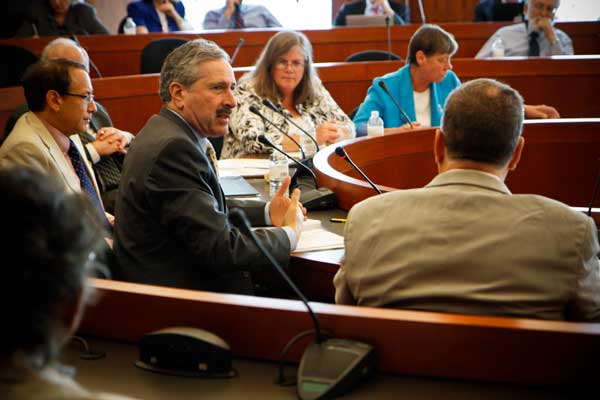When students struggle in a course, they might not realize they’re in trouble until the professor hands them back a failing midterm grade several weeks into the semester, too late to drop the course.
But that could change under a Faculty Senate committee’s plan that would push faculty to assigned graded work by the fifth week of the semester to help more students make it through tough courses and get closer to earning their degrees.
The educational policy committee will propose the resolution Friday, the first faculty-led effort to improve the University’s graduation rate, which shows that one out of five students do not graduate within six years.
“It’s just a matter of decency, really, for the faculty to try to get with those students who might need some help earlier,” Robert Harrington, the committee chair, said. “If it’s early in the semester, you can probably do some changing around to help a student move away from what is totally unsuitable behavior.”
With more chances to be tested on the material, students will also have more opportunities to improve their grades, said Lilien Robinson, an art history professor who also sits on the committee.
She said a higher grade point average can help motivate a student to stay at GW and “take as many hours as they can to graduate.” Eighteen percent of students who do not graduate have a GPA of less than 2.0 when they leave the University, according to the committee’s research.
Robinson said giving students regular updates of their progress is more difficult – but also more important – in larger classes that are light on discussion.
“What you typically do is you only give one midterm. You tend to give that at the half point, and that may at times may be early enough. It’s something to have faculty think about when they plan their syllabus,” Robinson said.
Instead, she pointed to intensive writing courses, like Writing in the Disciplines, in which students are given multiple written assignments throughout the semester, unlike other courses that only grade students on a few tests.
The committee cannot require faculty to change their syllabi, such as mandating more graded assignments, because of restrictions in the faculty code, so the resolution can only make recommendations.
The Faculty Senate plan coincides with a months-long effort by top administrators to better understand why students do not graduate.
Nearly 81 percent of GW students graduate in six years, a rate that is above the national average but worse than peer schools such as New York and Boston universities.
To improve its rate, administrators are looking at one of the campus populations with the best chances of graduating: student-athletes.
Each athlete follows an intensive academic path, which includes mandatory study hours as well as regular communication among students, professors, coaches and the departments’ academic advisers.
To translate that type of regular feedback channel to the larger student population, faculty could be pushed to enter grades in the Banner system sooner, according to the resolution.
If that service became available, faculty could leave notes for students more easily than seeking them out separately, said Ormond Seavey, and English professor and committee member.
Seavey said it would not burden most professors to let students know earlier in the semester, because most try to have an idea of how their students are doing in class anyway.
“Most of us know something about our students early on. So this will call attention to those who don’t do that but maybe should,” he said.







